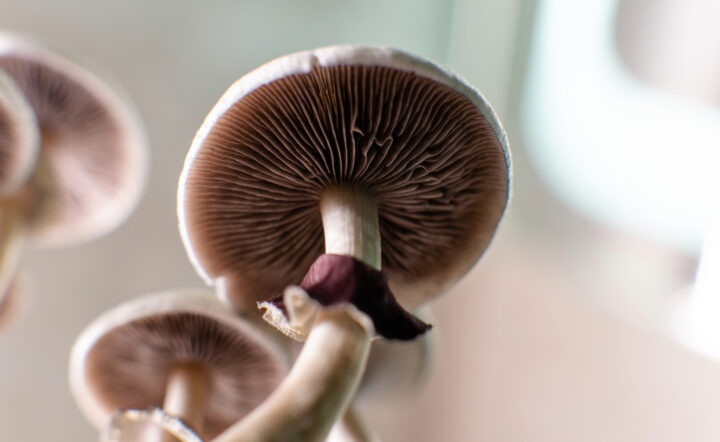Understanding Psilocybin Therapy
In recent years, psilocybin therapy has emerged as a promising frontier in mental health treatment, capturing the attention of researchers, clinicians, and those seeking alternative approaches to healing.
This groundbreaking therapy, which utilizes the psychoactive compound found in certain mushrooms, is showing remarkable potential in addressing a range of mental health conditions.
As we delve into psilocybin therapy, we'll explore its underlying mechanisms, the scientific evidence supporting its use, and the carefully structured process that guides patients through this transformative experience.

Here is a comprehensive overview of this innovative treatment approach, from its effects on the brain to its clinical applications, safety considerations, and future directions.
Join us on a journey through the fascinating realm of psilocybin therapy, where ancient wisdom meets cutting-edge science in pursuing mental wellness and personal growth.
How It Works
Psilocybin, when ingested, is converted into psilocin in the body. This compound then interacts with serotonin receptors in the brain, particularly the 5-HT2A receptors. This interaction leads to several effects:
- Altered perception and thought patterns
- Increased emotional responsiveness
- Enhanced connectivity between different brain regions

These changes may help break rigid thought patterns associated with mental health issues, allowing patients to gain new perspectives on their problems.
The Therapeutic Process
Psilocybin therapy typically involves three main stages:
1. **Preparation**: Patients meet with therapists to build trust and understand what to expect.
2. **Psilocybin Session**: In a controlled environment, patients receive a dose of psilocybin and are guided through the experience by trained professionals. This session usually lasts 6-8 hours.
3. **Integration**: Following the session, patients discuss their experiences with therapists to derive meaning and apply insights to their daily lives.
Potential Benefits
Research suggests that psilocybin therapy may offer several benefits:
- Reduced symptoms of depression and anxiety
- Increased emotional empathy and mindfulness
- Improved ability to process traumatic memories
- Enhanced neuroplasticity, potentially leading to long-lasting positive changes

Considerations and Future Directions
While promising, psilocybin therapy is still under investigation. It's crucial to note that this treatment should only be administered by trained professionals in controlled settings.
As research progresses, psilocybin therapy may become a valuable tool in mental health treatment, offering hope to those who haven't responded well to traditional therapies.
The Science Behind Psilocybin's Effects on the Brain
Psilocybin therapy has gained attention for its potential to treat various mental health conditions. We must explore its effects on the brain to understand how it works.
Brain Desynchronization
When a person takes psilocybin, it causes a significant disruption in the brain's normal functioning:
- It desynchronizes brain networks, particularly the default mode network (DMN)
- This desynchronization is more profound than that caused by other substances
- The DMN is responsible for our sense of self, time, and space
Altered Connectivity

Psilocybin changes how different parts of the brain communicate:
- It reduces connections within networks
- It decreases anti-correlations between networks
- This leads to a more flexible, adaptable brain state
Impact on Key Brain Regions
Psilocybin mainly affects specific areas of the brain:
- The anterior hippocampus, involved in emotional memory
- Parts of the default mode network
- Areas of the thalamus, basal ganglia, and cerebellum
Neuroplasticity and Lasting Effects
The changes induced by psilocybin aren't just temporary:
- It may increase emotional and brain plasticity
- Some alterations in brain connectivity can persist for weeks
- This lasting impact might contribute to its therapeutic potential

Subjective Experience
The brain changes correlate with the psychedelic experience:
- Users often report a sense of ego dissolution
- Many describe feelings of interconnectedness
- Some have mystical or profound experiences
Understanding these brain changes helps explain why psilocybin therapy might be effective for conditions like depression or anxiety. By temporarily disrupting rigid thought patterns and increasing brain flexibility, psilocybin may allow individuals to break free from entrenched mental states and gain new perspectives on their lives and struggles.
Clinical Applications and Research Findings
Psilocybin therapy has shown promising results in various clinical applications, particularly in treating mental health conditions. Recent studies have highlighted its potential in addressing several disorders:
Depression
- Significant reduction in depressive symptoms observed in multiple trials
- Effects often lasting up to a year after treatment
- Particularly effective for treatment-resistant depression
Anxiety and End-of-Life Distress
- Reduced anxiety in cancer patients
- Improved quality of life and increased optimism in terminally ill individuals
- Sustained benefits observed for months after treatment

Addiction Treatment
- Promising results in treating nicotine and alcohol dependence
- Potential for long-term or even permanent beneficial effects with just a few sessions
Key Research Findings
- Rapid onset of therapeutic effects, often within days of treatment
- Sustained benefits lasting months to a year in many cases
- High remission rates compared to traditional antidepressants
- Improvements in psychological flexibility and mindfulness
Treatment Protocol
Psilocybin therapy typically involves:
1. Preparatory sessions with therapists
2. Supervised psilocybin administration (usually 1-3 sessions)
3. Integration sessions to process the experience
Safety and Considerations
- Generally well-tolerated with few serious adverse effects
- Treatment conducted in controlled settings with medical supervision
- Not recommended for individuals with certain psychiatric conditions or heart problems
While these findings are encouraging, it's important to note that psilocybin therapy is still under investigation. More significant, long-term studies are needed to fully understand its efficacy and safety profile.
However, the current research suggests that psilocybin therapy could become a valuable tool in treating various mental health conditions, offering hope to those who haven't responded well to traditional treatments.

The Therapeutic Process and Safety Considerations
Psilocybin therapy involves a carefully structured process designed to maximize therapeutic benefits while ensuring patient safety. Understanding this process and its safety considerations is crucial for anyone considering or interested in this treatment approach.
The Therapeutic Process
1. **Screening and Preparation**
- Thorough medical and psychological evaluation
- Discussion of personal history and treatment goals
- Preparation sessions to build trust and set expectations
2. **The Psilocybin Session**
- Conducted in a comfortable, controlled environment
- Patients typically wear eyeshades and listen to music
- Therapists provide support but minimal intervention
- Session duration: usually 6-8 hours
3. **Integration**
- Follow-up sessions to process the experience
- Guidance on applying insights to daily life
- Development of strategies for maintaining benefits
Safety Considerations
- Medical Screening
- Exclusion of individuals with certain heart conditions
- Careful evaluation of psychiatric history
- Assessment of potential drug interactions
- Controlled Environment
- Sessions conducted in clinical settings
- Constant supervision by trained professionals
- Emergency medical equipment on hand

- Psychological Support
- Therapists trained in psychedelic-assisted therapy
- Emphasis on creating a safe, supportive atmosphere
- Strategies for managing challenging experiences
- Dosage Control
- Precise measurement of psilocybin doses
- Gradual increase in dosage across sessions if needed
- Post-Session Care
- Monitoring for any adverse effects
- Provision of support resources
- Follow-up appointments to ensure well-being
While psilocybin therapy shows promise, it's crucial to approach it with caution. The treatment should only be administered by qualified professionals in appropriate settings. Self-administration or recreational use of psilocybin can be dangerous and is not considered therapeutic. As research progresses, these safety protocols continue to evolve, ensuring that psilocybin therapy can be explored as a potential treatment option while prioritizing patient well-being.
Future Directions and Challenges in Psilocybin Research
As psilocybin therapy continues to gain attention, researchers are exploring new avenues while addressing significant challenges. The field is evolving rapidly, with promising developments and essential considerations for the future.
Expanding Research Areas
- Treatment of additional mental health conditions beyond depression and anxiety
- Exploration of psilocybin's potential in treating addiction disorders
- Investigation of long-term effects and optimal dosing strategies
Technological Advancements
- Development of more precise delivery methods for psilocybin
- Use of neuroimaging to better understand brain changes during therapy
- Integration of virtual reality in psilocybin-assisted psychotherapy sessions

Regulatory and Legal Progress
- Increasing production quotas for psilocybin research
- Potential FDA approval for specific psychedelic therapies
- Evolving legal landscape for psychedelic substances
Challenges in Research
- Difficulty in conducting double-blind studies due to psilocybin's noticeable effects
- Need for more extensive, multi-site clinical trials to establish efficacy
- Addressing concerns about research bias and maintaining scientific rigor
Ethical Considerations
- Ensuring equitable access to psilocybin therapy if approved
- Balancing potential benefits with safety concerns
- Addressing the commercialization of psychedelic treatments
Future Directions
- Exploring personalized approaches to psilocybin therapy
- Investigating potential synergies with other therapeutic modalities
- Developing standardized protocols for psilocybin-assisted psychotherapy
As research progresses, the scientific community faces the task of addressing these challenges while maintaining the momentum of discovery. The future of psilocybin therapy holds great promise but requires careful navigation of scientific, ethical, and regulatory landscapes.
With continued research and collaboration, psilocybin therapy may become a valuable tool in mental health treatment, offering new hope to those who have not found relief through traditional methods.
Psilocybin therapy represents a groundbreaking frontier in mental health treatment. As we've explored, this innovative approach offers promising results for various conditions, backed by an emerging scientific understanding of its effects on the brain. The carefully structured therapeutic process and rigorous safety protocols demonstrate the seriousness with which researchers and clinicians approach this treatment.
While challenges remain, the future of psilocybin therapy looks bright, with expanding research areas and potential regulatory progress on the horizon. As we continue to unravel the complexities of the human mind, psilocybin therapy may offer a powerful tool for healing and personal growth.
It's important to remember that psilocybin therapy is still under investigation and should only be pursued under professional guidance. As research progresses, we may be witnessing the dawn of a new era in mental health treatment – one that harnesses the transformative potential of psilocybin to bring hope and healing to those in need.




